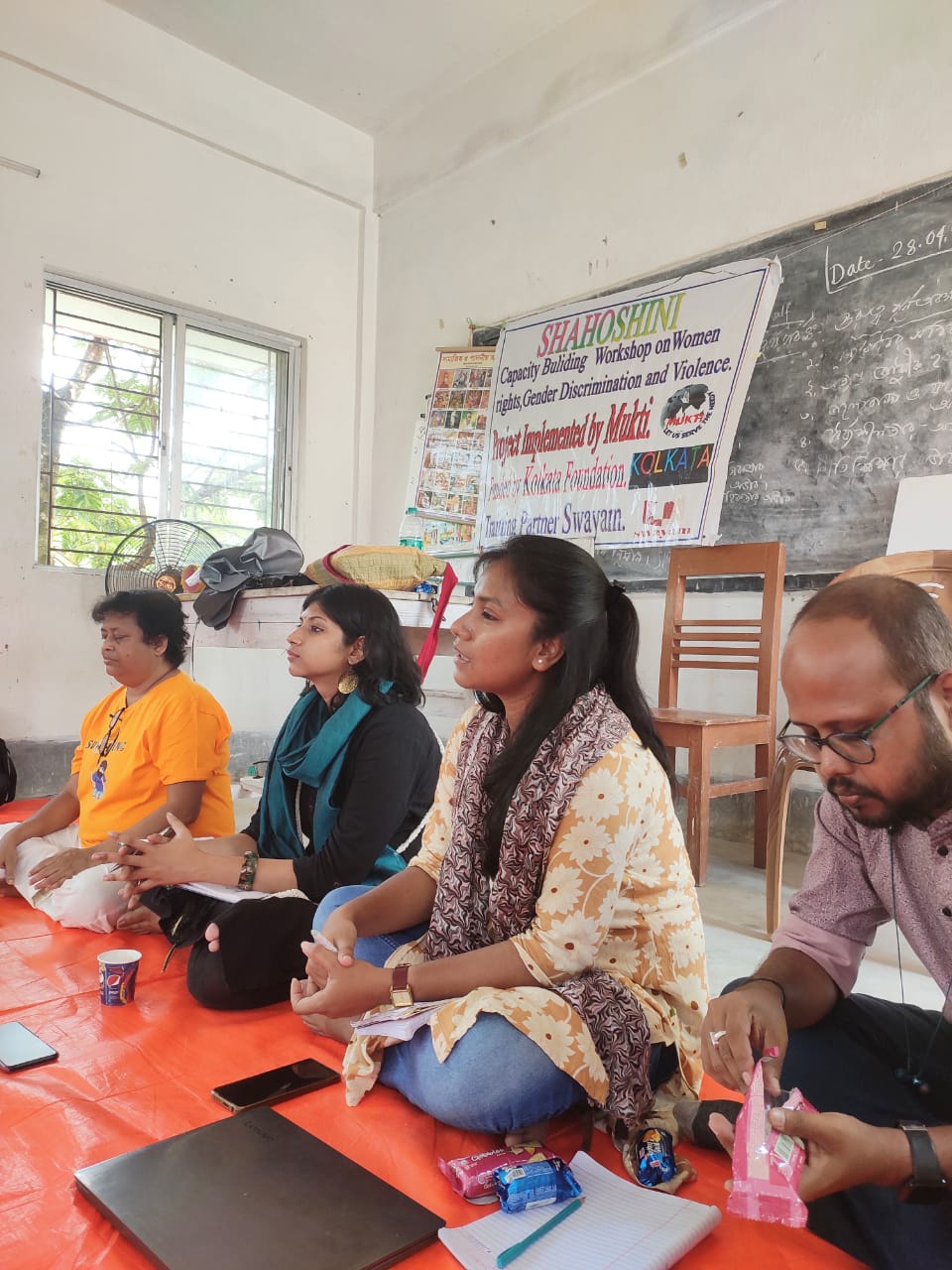

Building Stronger Communities: Mukti Empowers Women in the Sahosini Project Through Survey Training

Mukti organized a training session at Raidighi for 29 women involved in the Sahosini Project, on May 11th and 12th. The project “Sahosini” is a Kolkata Foundation initiative, developed in collaboration with Mukti and being implemented under the joint guidance of both organizations. The training was facilitated by two trainers from Swayam, the training partner for the Project. Ms. Nandita Jayraman, the Project Manager of Rights and Special Needs at Mukti, along with two Sahosini project field coordinators, Ms. Shiva Mandal and Ms. Devjani, represented Mukti during the training.

As part of the Sahosini Project, Mukti plans to conduct a community-level survey through the participating women. Each Sahosini member will survey 100 women in their respective areas to gain insights into their situations, including the discrimination and oppression they may be experiencing or the areas in which they may be lagging. Swayam provided a framework for the survey, including suggested questionnaire templates and questions, which were presented to the participants during the session. The participants also collaborated in group work to develop their own set of questions to be included in the survey.
Toward the end of the session, Mukti conducted a practical field test where the participants demonstrated their understanding of the survey process. This test aimed to assess their level of ownership of the process and identify areas where further guidance and training may be required. A detailed discussion followed, focusing on the challenges faced by the participants during the survey process.
Project Activities
- A village for independent and enterprising women (A VIEW) (5)
- About Mukti (4)
- Accreditation (14)
- AGM (63)
- Agriculture Reforms (124)
- Ambulance Service (2)
- Amplifying Community Voices (67)
- Awards (15)
- Awareness and Empowerment (136)
- Awareness drives (60)
- Bio-Village-Kankandighi (10)
- Careers (14)
- Chick Rearing Programme for Marginalised Women (16)
- CHILD (23)
- Climate Resilience River Embankment (46)
- Covid-19 (74)
- Cultural Shows (7)
- Cyclone Aila (13)
- Cyclone Amphan (44)
- Cyclone Bulbul (30)
- Cyclone Dana (3)
- Cyclone Remal (12)
- Cyclone Response & Recovery (90)
- Cyclone Tolerant Houses (15)
- Cyclone Yaas (57)
- Disaster Recovery (264)
- Editorial (57)
- Editorial by Abir Biswas (1)
- Editorial by Amit Kumar Dey (3)
- Editorial by Ananya Chatterjee (3)
- Editorial by Ankita Kothiyal (4)
- Editorial by Debabrata Halder (1)
- Editorial by Dr. Alokananda Ghosh Sengupta (2)
- Editorial by Kasturi Bakshi (1)
- Editorial by Monami Mitra (1)
- Editorial by Nandita (3)
- Editorial by Pampa Karmakar (1)
- Editorial by Pranay Patra (1)
- Editorial by Prof. Pradeep Ray (1)
- Editorial by Ranitendranath Tagore (1)
- Editorial by Sankar Halder (14)
- Editorial by Satyajit Ray (7)
- Editorial by Sohini Mehta (1)
- Editorial by Sonamon Basu (3)
- Editorial by Soumitra Bose (2)
- Editorial by Subhankar Basu (1)
- Editorial by Supriyo Banerjee (3)
- Editorial by Ujjwal Maity (2)
- Education and Enrichment (418)
- Environment and Resilience (127)
- Featured Activities (24)
- Gram Clinic (9)
- Health Water & Sanitation (97)
- HOPE (10)
- Impact Stories List (109)
- Integrated Development (219)
- International Management Institute (IMI) (2)
- Jal hi Kal (6)
- Kitchen Gardening (16)
- Livelihood & Enablement (220)
- MCDF (119)
- Medical Camp (45)
- MIT (8)
- MKSS (50)
- MSS (146)
- Mukti Academia (5)
- Mukti Academy (2)
- Mukti Craft (18)
- Mukti Cultural (2)
- Mukti Employment Exchange (MEE) (9)
- Mukti Fresh (15)
- Mukti Gram - Egra (11)
- Mukti Gram - Purbashridharpur (170)
- Mukti Green Defense in Sundarbans (11)
- Mukti Yoga (12)
- Mukto Dhara (2)
- Northumbria University (2)
- Obituary (6)
- Observance Days Celebration (53)
- Organic Farming & Training Support (45)
- Pond Rejuvenation (20)
- Prerana (1)
- Prerna (4)
- Projects For Mukti Wide (7)
- Queen Mary University of London (1)
- Rights and Special Needs (113)
- Run for Cause (13)
- Run4SafeFood (7)
- SDF (6)
- Shahoshini (9)
- Skill & Enterprise Development (21)
- Smart lab (5)
- Social Stock Exchange (2)
- Social Workers' Convention (1)
- Sundarbans Green (SUN-G) (15)
- Sunderban development fair project (4)
- Surya (13)
- Sustainable Agriculture Movement (63)
- SWAS-2-0 (19)
- Swastha Shongini (33)
- Swavalamban Accelerator in Sundarbans (SWAS) (21)
- Tour for Cause (45)
- TSS (198)
- UDAAN (8)
- Uncategorized (99)
- University of Calcutta (1)
- Value Education (12)
- Valued Partners (3)
- Vocational Trainings (15)
- VOICE (14)